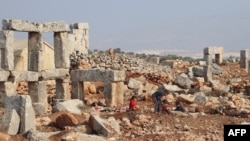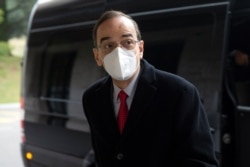Syrian observers say United Nations-sponsored talks in Geneva between the Assad government and the opposition to devise a new constitution will not accomplish that task nor will they help the nearly decade-long war ravaging the country turn a page. They add that Syrian elections slated for next year also are not considered pivotal or having any real bearing on changing the shattered country’s future.
The U.N.-sponsored meetings of Syria’s Constitutional Committee were intended to see a new constitution formed but are not hitting the mark, observers like the Atlantic Council’s Jomana Qaddour say, despite this being the fourth round of negotiations between the government and the opposition. Qaddour is a Syrian-American analyst and lawyer and spoke to a Carnegie Europe panel this week about the situation.
“We are basically left with only constitutional reform, but even that is not being received as a political negotiations process but is much more being seen and treated as a dialogue between the regime and the opposition on issues of citizenship, what is a Syrian, and things about symbols, etc. But you’re seeing a change in Geneva in how those conversations are happening. It’s not really requiring the regime or its allies to give up anything tangible. So, the teeth of those negotiations (are) slowly being removed,” said Qaddour.
Bassam Ishak, who heads the Syriac National Council, told VOA that he does not see much promise for a new constitution coming out of the Geneva talks and not all Syrian sectors are represented at the table.
“It’s a good goal to have the rule of law. Our problem in the Middle East in general and in Syria in the last 50 years, is not that the rule of law is not observed in the constitution. But that the constitution is not applied. In the constitution, they speak about free press. Is there free press? We want a democratic constitution that is applicable in reality. I don’t see a discussion of a constitution between all Syrian groups where everyone is heard out,” he said.
Talks first began in October 2019 and were delayed last August after some delegates tested positive for COVID-19. The U.N.’s deputy special envoy to the negotiations, Khawla Matar, admitted recently that “The committee has not made the kind of progress we hoped for.”
Kamiran Hajo, a Kurdish member of the opposition delegation, told Iraqi Kurdish media outlet Rudaw on Monday that “there has not been any serious progress” in the discussions.
It’s believed that regime committee members urged for participants to focus on the return of Syrians from abroad, according to the Syrian state-owned SANA news agency. However, fighting continues between the Syrian army and Turkish-backed opposition in the northwest province of Idlib.





